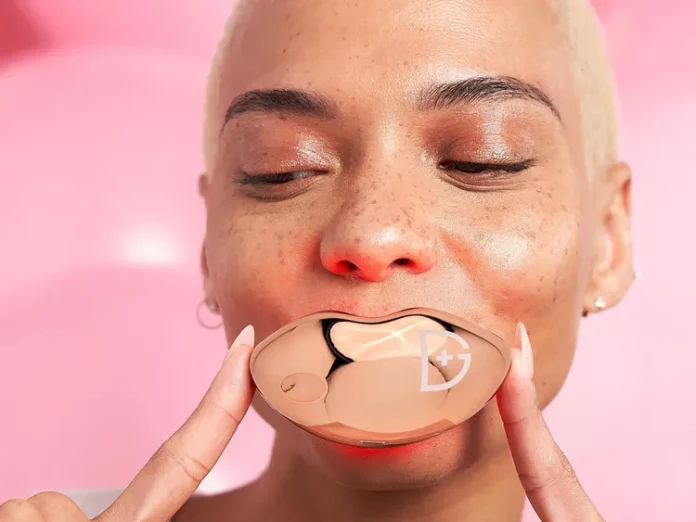At-home LED therapy devices are not new, and any beauty lover on TikTok has surely seen videos of content creators showcasing viral LED face masks from brands like Dr. Dennis Gross and Neutrogena. These often make you look like you’re wearing a Halloween costume or moonlighting as a member of the Jabbawockeez (if you know this reference, I love you).
As Instagrammable as these at-home beauty gadgets are, their main job is to treat the skin. LED light therapy has long been relied on during facials as an effective way to heal skin, reduce acne scars, and promote collagen production. When used around the lips, it has a similar effect.1
That said, when Dr. Gross declared his new lip treatment could be a substitute for dermal filler, Botox, and even lasers to treat lip lines, I had to investigate. I interviewed Dr. Gross and board-certified dermatologist Dr. Dendy Engelman to understand how LED lip treatment devices work and what drives the best results. Plus, I’m sharing my honest review of these devices.
MEET THE EXPERT
- Dr. Dennis Gross, MD, is a board-certified dermatologist, dermatologic surgeon, and founder of Dr. Dennis Gross Skincare.
- Dr. Dendy Engelman, MD, FACMS, FAAD, is a board-certified dermatologist and Mohs surgeon at Shafer Clinic Fifth Avenue in New York City.
What Are LED Lip Therapy Devices?
“An LED [light-emitting diode] lip therapy device is a tool that increases blood circulation to make the lips appear plumper and minimize signs of aging, such as filling in fine lines and wrinkles,” says Dr. Engelman. They don’t require much of a commitment: “Using the device just three to five minutes a day (depending on the device) will stimulate collagen production, improving [the] elasticity, texture, and tone of your lips,” Dr. Engelman says. “Most devices can be inserted into the mouth, making it an efficient, hands-free tool for busy mornings or nights.”
To use these devices, press the “on” button and simply bite down on the mouth plate or hold it over your lips with one hand. After three minutes, it automatically shuts off. Dr. Gross recommends using it daily for four weeks to see results.
:max_bytes(150000):strip_icc():format(webp)/currentbodylipdevice-0a419aa6bc08452ebfe9a39eea05bf41.jpg)
Why They’re Trending
As mentioned, at-home LED therapy devices have been around for a while. The market is saturated with them, from spot treatments for acne to full face masks. Often, these masks do not cover the lips. But it’s one of the areas of the face people are most concerned—if not obsessed—with. “2023 is the year of the lips,” proclaims Dr. Gross on why he launched this device now. “Lips have always been a popular treatment area, but after the pandemic, I noticed a significant increase in lip augmentation appointments at the practice. [Patients] demand lip products and devices that support overall lip health and prolong injection results… between appointments.”
Thus, Dr. Gross’ trendy little lip device was born (it really is cute—shaped like lips and all). But he isn’t the only brand to create one. There are also models by CurrentBody and Revive, and it’s likely more will come to the market. As some suggest that the age of the “Instagram face” is over, and people are feeling “filler fatigue,” an at-home LED lip therapy device can be an alternative way to take care of and enhance the look of your lips.
“The lip and the surrounding area is thinner and more sensitive than the skin on the face and body, making it extra vulnerable to collagen breakdown, free radical damage, and premature aging,” Dr. Gross explains. “At-home professional-grade devices are the next big thing in lip care. It’s completely pain-free and… a natural way to plump the lips and reverse signs of aging around the entire mouth area.”
How It Works
“LED light produces various effects in the skin, depending on the wavelength of light used,” explains Dr. Engelman. “Red, infrared, deep red, and amber are some of the most common wavelengths used for lip treatment. Amber, red, and deep red light stimulate fibroblast cells in the outermost layers of skin (epidermis and papillary dermis), which signals collagen protein production.”
A lag in collagen production is one of the reasons our skin changes as we rack up birthday cake candles. Stimulating collagen production, while not an easy task, helps combat these changes. “[Collagen protein production] helps smooth and firm the skin of the lips, as well as reduce the appearance of fine lines and wrinkles,” Dr. Engelman notes. “Infrared LED light penetrates the deepest and stimulates circulation and wound healing, which helps plump the lips and improve their color and texture.”
Does Lip LED Therapy Actually Work?
“Yes!” enthuses Dr. Engelman, who has tested the Dr. Gross and CurrentBody devices herself. “It is easy to use and effective. I love LED!”
She goes on to share more about the results you can expect. “When performed correctly with high-quality, FDA-cleared tools, LED therapy is an effective way to improve the health, appearance, and function of the skin, including the skin of the lips,” she says.
:max_bytes(150000):strip_icc():format(webp)/363488848_6531911496866636_1706407674578448448_n-2c5243f41cf44d389d7a0b5d884ca96c.jpg)
LED Devices Aren’t a Replacement for Botox or Filler
For someone like me, who has never had dermal filler, a Botox lip flip, or a laser skin resurfacing treatment, LED light therapy seems like a relatively easy option for plumper lips. But is it too good to be true?
The main differences between these three treatments and LED lip therapy devices are time, financial commitment, and immediacy of results. “Infrared light has a volumizing effect on the lips and… improves their texture, which are two of the results people commonly seek with filler and Botox,” Dr. Engelman says. “However, to see results with LED therapy, you’ll need to be patient and keep up with the treatment. LED therapy has more subtle effects that are slower to appear than filler, Botox, and lasers. For that reason, I would not call LED therapy a true alternative to any of these solutions.”
Both experts agree that LED lip therapy complements these treatments and works on its own. Just be sure to level set your expectations. For instance, while it has a plumping effect, LED lip therapy won’t significantly change the shape of your lips the way dermal filler or a Botox lip flip might. It’s also not going to deeply repair the skin in the same way a strong laser, such as Fraxel, would. The results of using an LED lip therapy device will likely be much more subtle—and long-lasting (for instance, Botox wears off after around three months).
It also has significantly fewer risks and potential side effects, especially if you have a low pain tolerance or needle aversion. “LED therapy is a much lower-risk treatment than filler, Botox, or lasers, and absolutely yields results when done properly and consistently,” Dr. Engelman adds. “So it’s a great option for people who do not want to go all-in with injections and/or lasers,” as well as those who cannot safely undergo laser treatments.
We also can’t forget about cost. Often, these in-office procedures start at $500 per treatment (with repeat treatments for upkeep), whereas LED lip therapy devices run from about $150-$200 each.
Is LED Lip Therapy Safe?
This treatment is easy to do, painless, and generally considered “safe.” And no, it doesn’t emit any UV light or cause sun damage. Dr. Gross elaborates: “LED light therapy is very safe to use on the lips and the skin in general because it targets skin cells without causing damage. It also doesn’t emit UV radiation, so there’s no chance of tanning, sunburn, or skin cancer.”
Some of these devices are also FDA-approved. “When using a well-made, FDA-approved LED light therapy device, the wavelengths of light are readily absorbed into the skin and do not contain harmful ultraviolet light,” Dr. Engelman adds.
Who Is a Candidate For LED Lip Therapy?
Both experts agree that most people can use these tools, with Dr. Engelman calling them accessible and versatile treatment options. “Since LED therapy devices are both a preventative and restorative treatment, anyone can benefit from the tool,” she explains. “It is best for those who are looking to address lip wrinkles, fine lines, loss of elasticity, and uneven texture and tone.” Dr. Gross recommends starting as early as your 20s if you’re seeking preventative measures. (I wish these were around for me to try back in the early aughts.)
Still, even with the low risks, there are some situations in which you might want to avoid these devices. Dr. Engelman warns that those who are photosensitive should operate with caution. Dr. Gross flags those with active rashes or taking a prescription medication that increases their sensitivity to light, such as Accutane or prescription retinoids. If you have these concerns or any others, it is always wise to consult with a board-certified dermatologist before using an LED lip therapy device.
My Honest Review
It sounds a bit too good to be true. Use a device for three minutes a day and transform your lips? I was intrigued, enthused, and… skeptical.
After testing out the Dr. Dennis Gross and CurrentBody devices for a few months, I can confirm that both are extremely easy to use (I didn’t even need to reference the directions), completely pain-free, and I didn’t experience any negative side effects. The results are super subtle, and consistency is key. Using an LED light therapy device isn’t going to make you look like you got dermal filler or emulate the results of a laser resurfacing treatment. It won’t change the shape of your lips or do anything radical. But I did notice over time that my little lip lines bothered me less. My pout felt a bit juicier and looked rosier. I found it works especially well when used in tandem with a hyaluronic acid lip serum or product.
Perhaps the most challenging part is actually doing it multiple times a week, if not daily, to yield results. I tried to habit stack it as part of my daily getting-ready routine, popping it in while penciling in my eyebrows or curling my hair.
I also noticed that I had to wrap my lips around the bite plate to keep the device in place. This is the same pursing movement that gave me lip lines in the first place, so be careful to try and relax your lip when using it (rely more on your teeth to keep it steady). Having this thing in your mouth feels a little like the bite plates used when taking X-rays at the dentist, but I got used to it. Until I’m ready for a more transformative treatment, I’ll be lighting up my lips.


